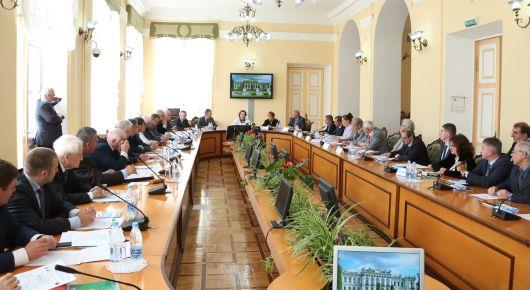FAO spearheads discussion on effective use of water resources

Effective management of water resources on irrigated lands, monitoring of irrigated and arid pastures, water conservation in irrigated agriculture, and the influence of agroforestry and protective afforestation on water conservation were the focus of the roundtable held here today at Timiryazev Agricultural Academy.
Co-organized by the FAO Liaison Office with the Russian Federation and the Russian State Agrarian University - Moscow Timiryazev Agricultural Academy, and supported by the Russian Ministry of Agriculture and the Russian National Committee for Irrigation and Drainage, the event was broadcast to leading agrarian universities across Russia and the Commonwealth of Independent States.
The roundtable-webinar on “Effective use of water resources in agriculture and agroecology” was the second such meeting of experts and policy-makers organized by FAO and the University in the framework of the Year of the Environment in Russia. The main objective of these meetings is to highlight some of the urgent issues related to environmental protection, preservation of biological diversity, and ensuring ecological security in Russia and the region.
The first event in the series took place last month and was devoted to “Smart technologies in agroecology and farming.”
In her opening remarks, Galina Zolina, acting Rector of Timiryazev Agricultural Academy, pointed out that “Reasonable use of water resources on an innovative technological basis could contribute to enhanced competitiveness, cost effectiveness and sustainability of agricultural production.”
“The untapped potential of the effective use of water resources is significant. Across the world, this effectiveness has not yet reached its technical maximum,” she added.
Participants watched the recorded address of Maria Helena Semedo, FAO's Deputy Director-General for Climate Change and Natural Resources, delivered earlier this year on the occasion of World Water Day.
“Leonardo da Vinci said, ‘Water is the driving force of nature.’Yet, today water scarcity is one of our greatest challenges. It threatens agriculture, food security, and nutrition,” Semedo said.
“Water use continues to surge at the same time that climate change – with increasing droughts and extreme weather – is altering and reducing water availability for agriculture. That puts a premium on making every drop count, underscoring the importance of meeting growing food production needs from efficiency gains,” Semedo concluded.
The webinar’s topics covered a broad spectrum of issues – from saving water in arable farming to water resources as the basis for food and environmental security – and tackled more specific problems, such as the role of the Don River basin’s sand massifs in supplying water and creating desalinated river systems, and the role of forest amelioration in improving water regimes and enhancing the productivity of agricultural andscapes in the Rostov region (Russia).
The next two events in the framework of the Year of the Environment, with FAO as co-organizer, will be held later in 2017 and will focus on soil and fishery resources.
30 May 2017, Moscow, Russian Federation
